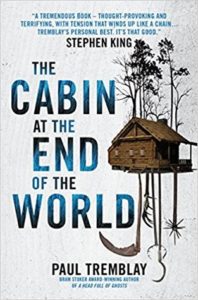PSA: This column includes spoilers for The Cabin at the End of the World by Paul Tremblay. Read at your own risk!
 While I am a pretty patient reader, one of my favorite experiences is when a book latches onto me from the very beginning and then does not let go. It’s a rare experience. I wake up thinking about the book, pluck it off my nightstand to read for those precious few minutes before my son gets up. I read through breakfast, lunch, dinner, in line at the grocery store. I move my son a little more quickly through his bedtime routine so I can curl up in my own bed and read, often until way too late, my blood pumping faster because I need to know what happens next.
While I am a pretty patient reader, one of my favorite experiences is when a book latches onto me from the very beginning and then does not let go. It’s a rare experience. I wake up thinking about the book, pluck it off my nightstand to read for those precious few minutes before my son gets up. I read through breakfast, lunch, dinner, in line at the grocery store. I move my son a little more quickly through his bedtime routine so I can curl up in my own bed and read, often until way too late, my blood pumping faster because I need to know what happens next.
In his novel Misery, Stephen King calls this The Gotta: “I gotta know will she live. I gotta know will he catch the shitheel who killed his father. I gotta know if she finds out her best friend is screwing her husband. The gotta. Nasty as a handjob in sleazy bar, fine as a fuck from the world’s most talented call-girl. Oh boy it was bad and oh boy it was good and oh boy in the end it didn’t matter how rude it was or how crude it was because in the end it was just like the Jacksons said on that record—don’t stop till you get enough.”
My favorite stories are the ones that have some serious gotta right from the get-go. It is also my personal feeling that—especially for new authors—these are the kinds of stories that have the best chance of success. Books compete with so many other things for attention: responsibilities, family, work, social media, smartphones, television, movies. People have so many options for how to spend their time, which they have increasingly less of. If a book doesn’t get them by page one, who’s to say they’ll come back? It’s my personal belief that one of our jobs as horror writers is to write in such a way that our readers just gotta know what happens next.
Okay, sure, but how do we do that? In this series, I’ll look at some books that I personally could not put down and try to pinpoint why. Maybe we can steal a few tricks for our own work.
Today, I’m looking at The Cabin at the End of the World by Paul Tremblay. I read it in two days, feeling feverish and anxious and like I just had to know, even if knowing was terrible. I’ve been thinking about it a lot, and I think books with this kind of gotta have three very important things: killer opening pages, high stakes, and a satisfying payoff.
The Beginning
In books filled with “gotta,” beginnings are crucial. I just re-read the first chapter of Cabin, and on the surface, it’s almost innocuous. It opens with almost-8-year-old Wen contentedly collecting grasshoppers in the front yard of her family’s vacation home. While doing so, she meets a (seemingly) very kind stranger named Leonard.
Re-reading this I thought, alright, it’s just a little girl collecting grasshoppers. What about that is so engaging? And really, it isn’t about what is being done here, but about how. Yes, Wen is collecting grasshoppers, and everything is peaceful. But imagine a camera lens here. It has zoomed in very close, so we get an intimate look at who Wen is—and early hints of what might be at stake. Like here: “Wen promised Daddy Andrew she would release the grasshoppers before they got cooked inside the homemade terrarium”. This one simple sentence is working very hard. It tells us that Wen is the kind of girl who cares deeply, even for the insects that many would ignore. It also builds subtle tension: the captured grasshoppers ominously foreshadow what is about to happen to Wen’s family. Even in this idyllic scene, there is a feeling of dread. Wen is going to release the grasshoppers before they die, right? Already, the clock is ticking.
And then there is Leonard, the man who earns Wen’s trust because of his smile, which is “so real as to be contagious”, despite the many “stranger-danger” conversations she’s had with her dads. Leonard appears seemingly out of nowhere, and Wen feels safe out there in the country where everything is peaceful. Nothing overtly tense is going on here. But things are…off. Leonard keeps looking over his shoulder. He tells Wen she is pretty, which makes her uncomfortable. When Wen tells him that she’ll be eight in six days, “Leonard’s smile falters a little bit, like her answer to the question is a sad thing”. Wen tells Leonard about how she was born with a cleft lip and how she has two dads. As the scene progresses, the tension builds noticeably, with Leonard turning around more frequently, and “sounds that can now be heard plainly and without them having to be quiet. Familiar sounds, feet tramping and stomping their way down the dirt road, like earlier when Leonard showed up”. Things get really weird when, as three other people carrying strange weapons move toward them, Leonard says, “You are a beautiful person, inside and out. One of the most beautiful people I’ve ever met, Wen. Your family is beautiful and perfect, too. Please know that. This isn’t about you. It’s about everyone”. At this point Wen is hurrying backward, rushing for the house, knowing something is very wrong but not yet understanding what. And just before she goes into the house, Leonard yells after her, “Your dads won’t want to let us in, Wen. But they have to. Tell them they have to. We need your help to save the world. Please.”
Whoa, okay, what the hell just happened? Exactly. That’s just how we’re supposed to feel. We went from happily collecting grasshoppers (although, even mixed in with all that happiness there was still a low-level hum of dread) to a kind but odd stranger to the sudden appearance of three more strangers to Leonard telling Wen he needs her help to save the world. We turn the page, just one more chapter, because we gotta know. And the tension builds, ramping up impossibly high as the strangers work their way inside the house, and we get to:
The Stakes
As I mentioned earlier, books that have the gotta have extremely high stakes. Impossible stakes. Stakes so high that you can’t see a way out for the characters, and so you read in cold sweat just because you’ve got to know how—or if—they get out of it.
In Cabin, the strangers have forced their way into Eric, Andrew, and Wen’s vacation house and tied them up (all except Wen.) The situation is already incredibly tense, but we don’t know why these strangers are doing these terrible things. To make things even more bizarre, the four intruders introduce themselves and attempt to remain kind. The situation is increasingly bizarre, but we still don’t know the true stakes just yet. At this point, we’ve read because the tension and dread has ramped impossibly fast and we were swept away in its momentum. When we learn the stakes, though? That’s the moment of truth, when we realize that we’ll have to keep reading to the end.
We approach the stakes in Cabin when Leonard drops this first bomb: “The four of us are here to prevent the apocalypse. We—and by we I mean everyone in this cabin—can stop it from happening but only with your help. In fact, it’s more than help. Ultimately, whether the world ends or doesn’t end is entirely up to you”. As readers, we’re intrigued, but the bottom hasn’t quite dropped yet. We keep reading because we can sense that we are hovering just on the edge of the stakes. Leonard continues: “Your family must choose to willingly sacrifice one of your three in order to stop the apocalypse”. And there it is. The bottom drops out and we are lost in this story, hopelessly at its mercy. Is it really the end of the world? Are these strangers crazy? Even if they’re not crazy, can a family really make that kind of a choice? Will the strangers force them to choose? How will they get out of this if they are imprisoned by these strangers? If no one is sacrificed will the world end? These are the questions that send readers hurtling forward through the narrative at a breakneck pace, because we’ve caught a serious case of the gotta, and before we know it, we’ve arrived at:
The Payoff
If you’ve read Cabin, then you know that Tremblay uses the gotta to ramp up the story and utterly wreck us along the way. But the hooky beginning and the subsequent revelation of the impossibly high stakes can only carry us so far. The gotta only works if the payoff is satisfying. It must surprise us, but also be logical. And when each of these components come together for a wildly surprising, emotionally devastating crescendo? That is the payoff. As readers, we know that the payoff’s been successful when we realize we never saw it coming, but yet we know it was all there all along, In Cabin, everything in Andrew and Eric’s entire lives have been obliterated and they have a decision to make. Eric, with his gun pressed to Andrew’s chest out of complete desperation, asks how they will go on from this? Andrew tells him that they will, and “We stare, and we watch the rain and we watch our faces, and we don’t say anything, and we say everything. Eric pulls the gun off Andrew’s chest, lowers his arm, and drops the gun to the forest floor. He leans into Andrew. Andrew leans into Eric. We lean into each other and our heads are side by side, cheek to cheek. Our arms hang at our sides like lowered flags, but our fingers find each other’s fingers, and we hold on.”
So simple. So sweet. So awful. So unexpected. Consider yourself good and wrecked.
The best stories not only make promises to the reader from the very beginning, but also deliver on those promises in a big way. They are artistic and beautifully crafted, but they also respect the readers time. They inform and provoke as much as they entertain. They leave us reading with our bedside light on into all hours of the night. Just one more chapter. We’ve just gotta know.
LISA QUIGLEY
Buy The Cabin at the End of the World by Paul Tremblay









